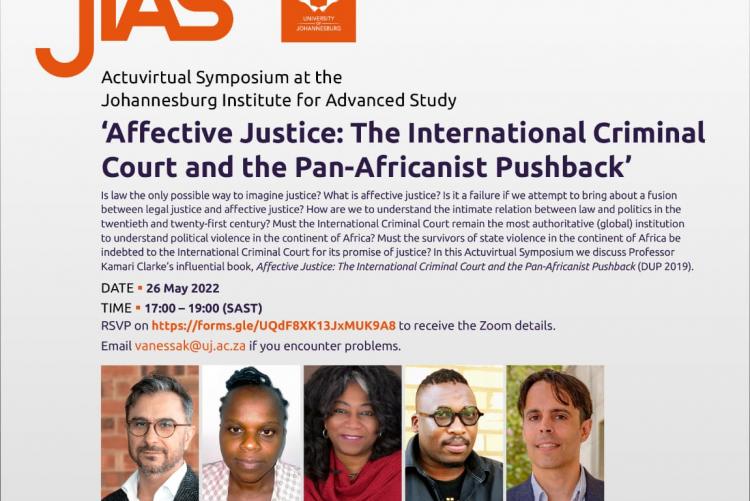Is law the only possible way to imagine justice? What is affective justice? Is it a failure if we attempt to bring about a fusion between legal justice and affective justice? How are we to understand the intimate relation between law and politics in the twentieth and twenty-first century? Must the International Criminal Court remain the most authoritative (global) institution to understand political violence in the continent of Africa? Must the survivors of state violence in the continent of Africa be indebted to the International Criminal Court for its promise of justice? In this Actuvirtual Symposium we discuss Professor Kamari Clarke’s influential book, Affective Justice: The International Criminal Court and the Pan-Africanist Pushback (DUP 2019).
May 26 at 5:00 pm - 7:00 pm
Time: 17.00-19.00 (SAST)
RSVP on https://forms.gle/UQdF8XK13JxMUK9A8 to receive the Zoom details.
Email vanessak@uj.ac.za if you encounter problems.
Evelyne Owiye Asaala is a lecturer of law at the University of Nairobi, she holds a PhD from the University of Witwatersrand (South Africa), a Master of Laws degree from the Centre for Human Rights University of Pretoria (South Africa) and a Bachelor of Laws degree from the University of Nairobi (Kenya). Evelyne has published widely in the area of international criminal justice in Africa and transitional justice, and worked with The Trust Fund for Victims of the International Criminal Court, The American Bar Association, The Raul Wallenberg Institute, Saferworld International, the International Nuremberg Principles Academy, Truth Justice and Reconciliation Commission of Kenya (TJRC) and the Bail and Bond Task Force in Kenya.
Kamari Maxine Clarke is a Distinguished Professor of Transnational Justice and Sociolegal Studies at the University of Toronto at the Centre for Criminology and the Centre for Diaspora and Transnational Studies. For more than 20 years, Professor Clarke has conducted research on issues related to legal institutions, international legal domains, religious nationalism, and the politics of globalization and race. She has spent her career exploring theoretical questions of culture and power and, in the field of law and anthropology, detailing the relationship between new transnational formations and contemporary problems. She is the author of nine books and over fifty peer reviewed articles and book chapters, including her 2009 publication of Fictions of Justice: The International Criminal Court and the Challenge of Legal Pluralism in Sub-Saharan Africa (Cambridge University Press, 2009) and Affective Justice (with Duke University Press, 2019), which won the finalist prize for the American Anthropological Association’s 2020 Elliot P. Skinner Book Award for the Association for Africanist Anthropology and was the recipient of the 2019 Royal Anthropological Institute’s Amaury Talbot Book Prize. During her academic career she has held numerous prestigious fellowships, grants and awards, including multiple grant awards from the National Science Foundation and from The Social Sciences and the Humanities Research Council of Canada (SSHRCC), the Rockefeller Foundation, the Wenner-Gren Foundation for Anthropological Research and, very recently, the 2021 Guggenhiem Prize for Anthropology.
Tendayi Sithole is a professor in the Department of Political Sciences, University of South Africa. He is the author of Mabogo P. More: Philosophical Anthropology in Azania (Rowman and Littlefied International, 2022), The Black Register (Polity Press, 2020), and Steve Biko: Decolonial Meditations of Black Consciousness (Lexington Books, 2016).
Hannibal Travis is professor of law at Florida International University, and has published widely on genocide, cultural survival, and human rights. His research in this area has appeared in edited volumes from Cambridge University Press, the University of Pennsylvania Press, Palgrave, Berghahn, and Bloomsbury; the international law journals of the Cornell, Washington University, and Brooklyn law schools; and specialty journals such as the Middle East Quarterly, Genocide Studies and Prevention: An International Journal (twice), and The International Journal of Minority and Group Rights. He is the editor of The Assyrian Genocide: Cultural And Political Legacies (Routledge, 2017), and the author of Genocide, Ethnonationalism, and the United Nations: Exploring the Causes of Mass Killing Since 1945 (Routledge, 2012), and Genocide in the Middle East: The Ottoman Empire, Iraq, and Sudan (Carolina Academic Press, 2010).
Fazil Moradi is currently a visiting associate professor at Faculty of Humanities, Johannesburg Institute for Advanced Study, University of Johannesburg; associate researcher at the Institute for Social Anthropology, Austrian Academy of Sciences; and affiliated scholar at the Center for the Study of the Holocaust, Genocide, and Crimes against Humanity at the Ralph Bunche Institute for International Studies, Graduate Center—CUNY. He also works with medical scientists at the University of Gothenburg, studying the lasting impacts of chemical weapons. Moradi is the convener of the Actuvirtual Symposium and among his publications are: Palgrave Macmillan(2022); Critical Arts(2021); British Medical Journal(2020);Praesens Verlag(2020); Critical Studies(2019).
May 26 at 5:00 pm - 7:00 pm

